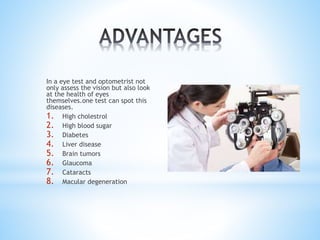Eyecare Near Me: Comprehensive and Reliable Vision Providers
Comprehending the Different Eye Issues Dealt With by Specialized Eye Care Professionals
In the world of eye treatment, specialized experts play an important function in identifying and dealing with a vast variety of eye conditions. From common refractive errors that affect vision clearness to age-related conditions that present difficulties as we age, the experience of these experts prolongs to managing vision-threatening conditions and intricate corneal disorders. The complexities of neurological eye problems existing special difficulties that require specialized treatment. As we embark on this expedition of the different eye problems resolved by specialized eye care specialists, it ends up being evident that the detailed internet of eye wellness holds a myriad of remarkable understandings waiting to be revealed.
Typical Refractive Errors
Refractive mistakes are common visual conditions created by an imperfection in the eye's capacity to appropriately focus light, causing obscured vision. One of the most common types of refractive errors consist of nearsightedness (nearsightedness), hyperopia (farsightedness), astigmatism, and presbyopia. Nearsightedness occurs when the eyeball is also long or the cornea is as well rounded, causing remote objects to show up blurred. Hyperopia, on the various other hand, takes place when the eyeball is also short or the cornea is too flat, leading to neighboring objects running out emphasis. Astigmatism is defined by an irregularly shaped cornea, leading to altered or obscured vision in all distances. Presbyopia is an age-related problem where the lens loses its versatility, making it challenging to concentrate on close things.
These refractive errors can be fixed with various methods, including spectacles, contact lenses, or refractive surgical treatment. Eye treatment professionals play an essential duty in detecting and taking care of refractive mistakes to aid individuals accomplish more clear vision and boost their high quality of life.
Age-Related Eye Problems
One of the most common age-related eye conditions is age-related macular deterioration (AMD), an illness that triggers central vision loss and can make tasks like reading and driving challenging. Cataracts, another usual problem among older individuals, trigger clouding of the eye's natural lens, leading to blurred vision. Routine eye exams with specialized eye care experts are essential for early detection and administration of these age-related eye conditions to protect vision and maintain eye wellness as people grow older.
Vision-Threatening Conditions
Vision-threatening illness incorporate a series of serious eye conditions that have the possible to substantially affect a person's sight and overall aesthetic function. These conditions present a risk of irreversible vision loss otherwise without delay detected and dealt with by specialized eye treatment experts. Some typical vision-threatening diseases include glaucoma, diabetic person retinopathy, age-related macular This Site degeneration (AMD), and retinal detachment.
Glaucoma is a team of eye problems that harm the optic nerve, often due to high intraocular pressure, leading to outer vision loss and potential loss of sight if left without treatment. AMD is a modern problem affecting the macula, leading to central vision loss.
Very early discovery, normal eye examinations, and timely intervention are important in taking care of vision-threatening conditions to maintain eyesight and maintain lifestyle. Specialized eye care experts play a crucial duty in diagnosing, dealing with, and taking care of these conditions to prevent irreparable vision loss.

Corneal Conditions
Corneal disorders incorporate a range of conditions that affect the clear front component of the eye, called the cornea. These disorders can result in pain, aesthetic disruptions, and check my source in extreme cases, vision loss. One usual corneal condition is keratoconus, where the cornea thins and protrudes outside right into a cone shape, creating astigmatism and blurred vision. Corneal dystrophies, such as Fuchs' dystrophy, cause progressive vision loss as a result of unusual deposits in the cornea. Corneal abrasions, commonly triggered by injury or foreign items, can cause pain, redness, and sensitivity to light. Additionally, infections like keratitis can irritate the cornea, potentially bring about scarring and vision impairment if not without delay dealt with. Treatment for corneal problems varies depending upon the specific condition but might include medications, contact lenses, or in severe situations, corneal transplants. Regular eye exams are important for very early discovery and monitoring of corneal conditions to protect vision and eye wellness.
Neurological Eye Conditions
Neurological eye problems entail disorders that impact the connection between the eyes and the brain, affecting visual handling and overall eye feature. These conditions can materialize in different ways, impacting vision, eye activities, and even the coordination between the eyes. One typical neurological eye problem is optic neuritis, characterized by inflammation of the optic nerve resulting in vision loss, shade desaturation, and pain with eye motion.
One more considerable problem is nystagmus, where the eyes make repetitive, unchecked activities, influencing visual acuity and depth perception. Additionally, problems like amblyopia, commonly described as "lazy eye," result from irregular aesthetic growth in very early childhood, causing decreased vision in one eye.
Neurological eye conditions need specialized care from professionals like neuro-ophthalmologists who have competence in both neurology and ophthalmology. Medical diagnosis usually involves an extensive eye examination, imaging researches, and cooperation with neurologists to deal with the underlying neurological issues affecting the visual system. Therapy techniques can consist of medication, vision treatment, or in extreme cases, medical treatments to handle these intricate conditions effectively.

Conclusion
To conclude, specialized eye treatment experts treat a vast variety pop over to this site of eye problems, including usual refractive errors, age-related eye problems, vision-threatening illness, corneal problems, and neurological eye conditions - refractive surgeries in al. By recognizing these different conditions and looking for ideal therapy from eye care professionals, individuals can preserve optimum eye health and wellness and vision. It is essential to prioritize routine eye examinations and follow advised therapy strategies to preserve and safeguard one's vision for the future